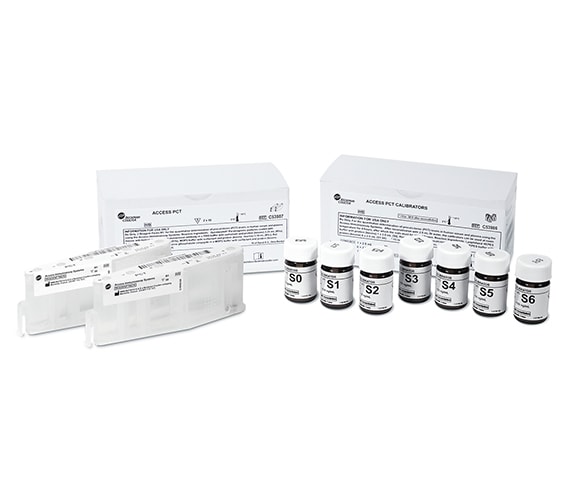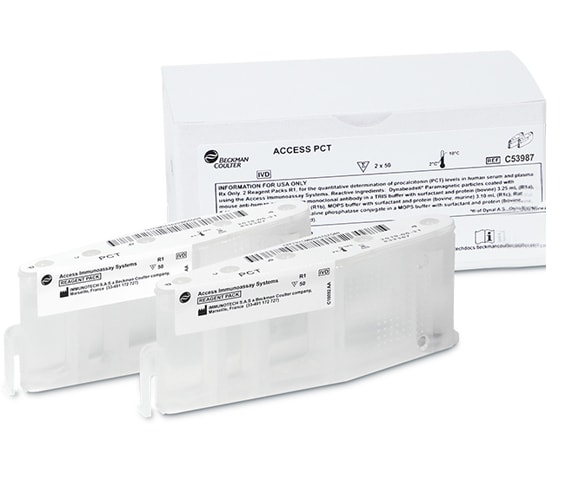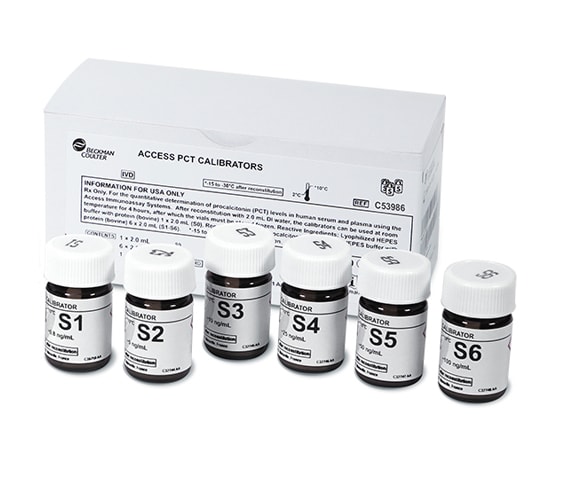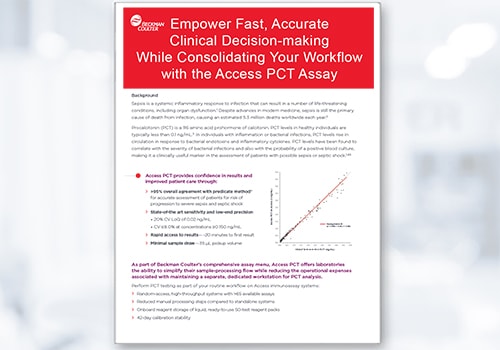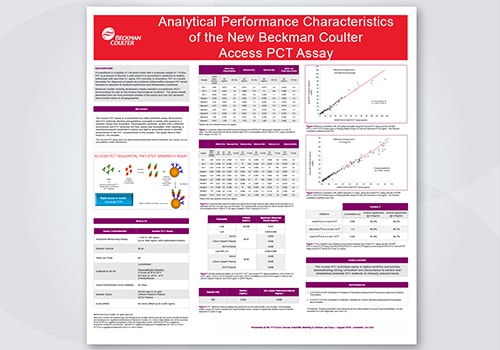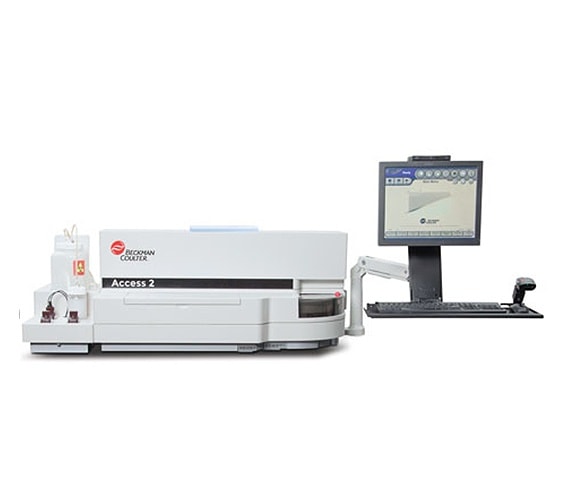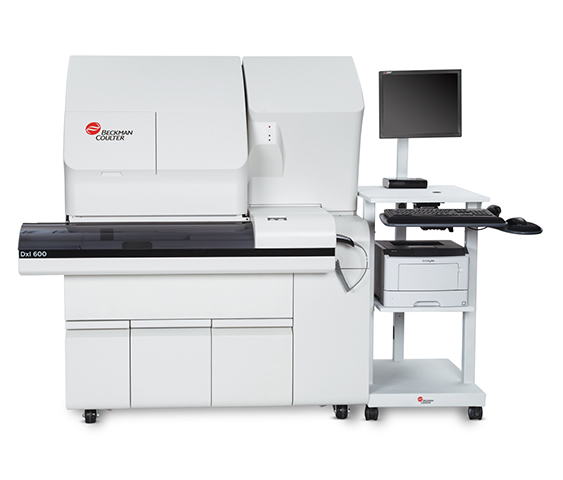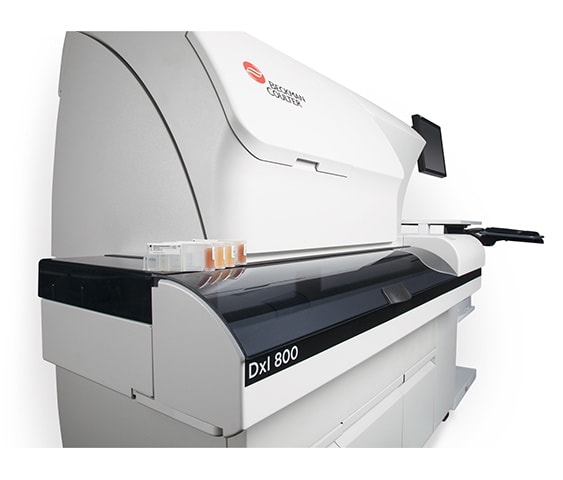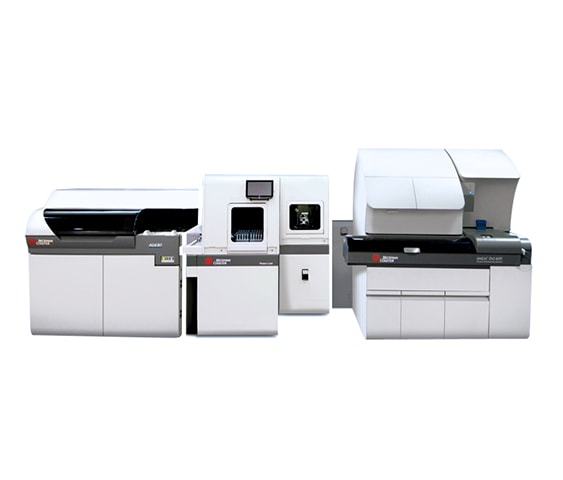Access PCT Advances Patient Care While Optimizing Laboratory Workflows
Provide confidence in results and improve patient care through:
- >95% overall agreement with predicate method for accurate assessment of patients at risk of progression to severe sepsis and septic shock
- State-of-the art sensitivity and low-end precision―20% CV LoQ of 0.02 ng/mL and CV ≤8% at concentrations of ≥0.150 ng/mL
- Rapid access to results with first result in approximately 20 minutes
- Minimal sample draw of 35 µl pick-up volume
Accuracy: Access PCT shows low mean bias and strong correlation and method concordance to the B·R·A·H·M·S PCT®-sensitive Kryptor method at key clinical decision points as demonstrated in an independent study conducted in two centers.1
Correlation and Concordance Chart
| Comparator | Access PCT (Access 2) |
Access PCT (DxI 800) |
Roche ELECSYS® B•R•A•H•M•S PCT® (cobas e801) |
bioMérieux VIDAS® B•R•A•H•M•S PCT® |
Abbott ARCHITECT® B•R•A•H•M•S PCT® |
| Mean Bias |
3.8% (1.1% to 6.5%) |
2.4% (-1.3% to 6.1%) |
-14.9% (-18.5% to -11.2%) |
0.2% (-4.9% to 5.4%) |
-7.2% (-10.1% to -4.3%) |
| Correlation |
r = 0.997 |
r = 0.994 |
r = 0.985 |
r = 0.994 |
r = 0.995 |
| Concordance at 0.5 ng/mL |
100% | 100% | 99% | 99% | 99% |
| Concordance at 2.0 ng/mL |
98% |
97% |
96% |
97% |
98% |
Table adapted from data presented in Lippi et al., Clin Chem Lab Med 2019. B・R・A・H・M・S PCT® is a registered trademark of B・R・A・H・M・S GmbH.
Simplify sample processing and reduce separate PCT analysis workstation costs with:
- Random-access, high-throughput systems with an extensive assay menu and 50 reagent pack positions
- Fewer manual processing steps compared to standalone systems
- Onboard reagent storage of liquid, ready-to-use, 50-test reagent packs
- 42-day calibration stability
What is the Connection between Procalcitonin and Infections?
The procalcitonin amino acid peptide is a precursor of calcitonin. In healthy individuals, procalcitonin (PCT) levels are typically less than 0.1 ng/mL.2 In individuals with inflammation or infections, PCT levels rise in circulation in response to inflammatory cytokines and bacterial endotoxins.
How is Procalcitonin Used as a Risk Assessment Tool for Sepsis?
PCT levels correlate with the severity of bacterial infections and the probability of a positive blood culture. That makes it a clinically useful diagnostic marker in the assessment of patients with suspected sepsis or life-threatening septic shock.3,4,5
PCT blood tests can aid in differentiating between sepsis of viral or bacterial origin. PCT tests also support monitoring the course and severity of a sepsis systemic inflammatory response.
How Can Clinicians Use Procalcitonin for the Risk Assessment for Sepsis?
Interpretation of Results
|
PCT Concentration
(ng/mL or μg/L) |
Interpretation |
| <0.5 | Low risk of severe sepsis and/or septic shock |
| >2.0 | High risk of severe sepsis and/or septic shock |
Concentrations under 0.5 ng/mL do not exclude local infections or systemic infections in their initial stages (e.g., under 6 hours from onset of illness). PCT concentrations between 0.5 and 2.0 ng/mL should be interpreted with consideration of the patient's history. In this range, it is recommended to retest PCT within 6 to 24 hours.6
 English
English

